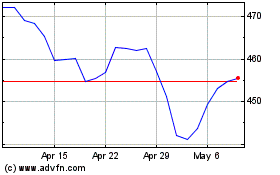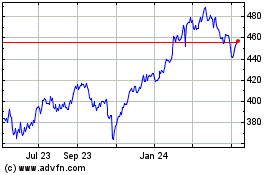U.S. Supreme Court Won't Review Visa, Mastercard Fees Case -- 3rd Update
March 27 2017 - 4:43PM
Dow Jones News
By AnnaMaria Andriotis and Brent Kendall
The Supreme Court on Monday declined an invitation to rescue a
$7.25 billion antitrust settlement over fees between Visa Inc. and
Mastercard Inc. and retailers, effectively clearing the way for
merchants to sue for additional charges incurred in recent
years.
This raises the prospect that Visa and Mastercard could face
higher legal costs. Retailers such as Macy's Inc., Home Depot Inc.
and Target Corp. that had opted out of the settlement had brought
lawsuits against the card companies, but these covered fees from
before 2013. Now, the retailers may be able to sue over fees after
that period.
The Supreme Court decision also creates an opening for legal
action by merchants who want to challenge moves by Visa and
Mastercard to raise so-called credit-card swipe fees in the
future.
Those fees are at the heart of the long-running legal battle.
Whenever a consumer uses a credit card for a purchase, merchants
pay a swipe fee that is divided between a number of parties
including card companies and banks, among others.
Who has the power to set these fees doesn't directly affect
consumers. Rather, it revolves around the question of who has the
power to set the swipe fees, how high they will go and how they get
divvied up among the many behind-the-scenes players in a
credit-card transaction.
Visa declined to comment on the Supreme Court's action. A
Mastercard spokesman said the company "will continue to work with
all parties to ensure a proper resolution of this matter as it
moves forward" in federal courts.
The Supreme Court said in a brief order said it won't review a
federal appeals court decision from last June that invalidated the
settlement between the card companies and retailers. In that
ruling, the New York-based Second U.S. Circuit Court of Appeals
said the settlement was problematic because some groups of
merchants weren't adequately represented.
The appeals court found the settlement had problems because it
sought to cover two groups of plaintiffs with different interests:
One group of merchants that was in line to receive monetary damages
based on credit-card fees they paid in the past, and another group
who wanted changes to the card companies' rules in the future.
The appeals court found the deal shortchanged those merchants
who were focused on the future card rules.
The legal battle dates back to a class-action lawsuit originally
brought by a small group of merchants that argued Visa and
Mastercard charged inflated swipe fees.
Large merchants and trade groups opposed the $7.25 billion
settlement because they said the amount was too low and because of
a provision that said that merchants -- including those that opted
out of the settlement -- wouldn't be able to bring future lawsuits
related to credit-card swipe fees against Visa and Mastercard.
The Supreme Court's decision to stay out of the case leaves
legal uncertainty for Visa and Mastercard, which already have been
defending the case for a decade.
Merchants had challenged a series of card-industry rules as
being anticompetitive, including one referred to as the "honor all
cards" requirement. That rule meant stores had to accept all Visa
and Mastercard credit cards no matter the varying fees associated
with them. Other rules prohibited charging different prices for
different types of payment.
The Supreme Court's decision to reject the case also raises
questions about whether card networks could encounter more pressure
related to how they establish credit-card swipe fees. Retailers,
with backing by trade groups including the National Retail
Federation, have taken legal action to change the way credit-card
swipe fees are set.
Many retailers don't want Visa and Mastercard to set the fees
anymore. Rather, they would like to shift this to individual banks,
a move they argue would create more competition and result in lower
fees for retailers.
In the wake of the Supreme Court's action, the focus of the case
will shift back to the U.S. District Court for the Eastern District
of New York, where additional proceedings are ongoing. It is
possible the card companies and the two different groups of
plaintiffs could try to strike new settlements.
Write to AnnaMaria Andriotis at annamaria.andriotis@wsj.com and
Brent Kendall at brent.kendall@wsj.com
(END) Dow Jones Newswires
March 27, 2017 16:28 ET (20:28 GMT)
Copyright (c) 2017 Dow Jones & Company, Inc.
MasterCard (NYSE:MA)
Historical Stock Chart
From Mar 2024 to Apr 2024

MasterCard (NYSE:MA)
Historical Stock Chart
From Apr 2023 to Apr 2024
